Since a young age I have been fascinated by Greek culture, history and mythology. I grew up with the stories of the Greek gods and heroes; Heracles, Jason and the Argonauts, Bellerophon, Theseus, Achilles and Odysseus to name a few. Later in life, when I was looking for men I could identify with and look up to, I came across the lives and deeds of Alexander the Great, Alcibiades, Leonidas, Agesilaus, Xenophon and many others. This exploration of Greek history and mythology has influenced my view on what is good and evil and in extend what good and bad behaviour might be. It started me on a path of discovering certain virtues and behaviours that, to me, seem lost in contemporary society. But I will explain these discoveries in more detail at a later date.
In the texts I´m going to write the upcoming weeks I will take you through some of the mythological stories, and the moralistic implications they could have on us today. First things first, I would like to start with the myth of the creation of mankind and the gift of fire Prometheus the titan brought us at a high personal price. (I´m using a slightly adapted and shortened version of this story written by Stephen Fry from the book Mythos. All credits go to him).
(As a side note, I realise some of you might not know much about Greek mythology and the hierarchy that the Olympian gods created when Zeus came to power. It would be quite a lot of work to explain the complete story, so my apologies for not going to much into detail. I am used to the original Greek names of the gods, not the Roman ones. For example: the supreme god who you might know as Jupiter (Jove) I will call Zeus. (Minerva is Athena, Mars is Ares, Neptune is Poseidon etc.) If you have some questions or suggestions, feel free to write me. I will put some recommendations down below If you want to learn more about mythology.
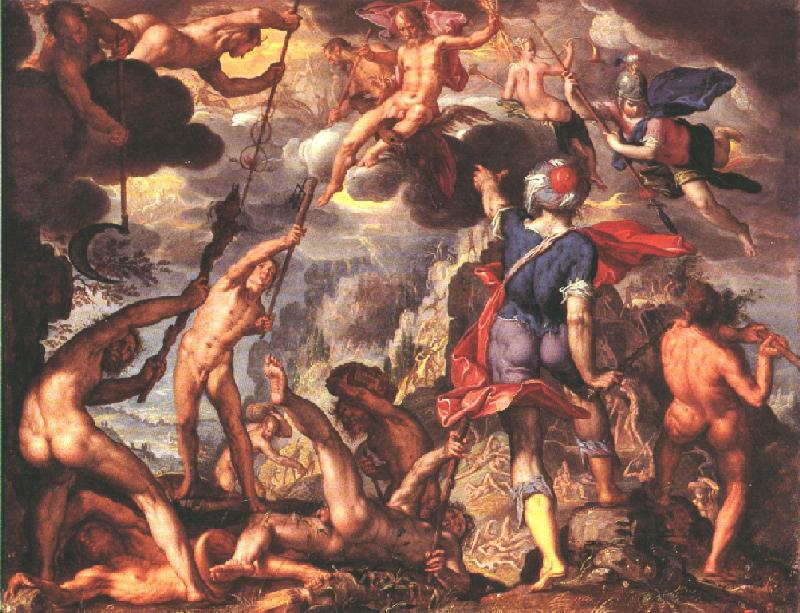
The creation of humankind came about when the all powerful Zeus started to feel lonely, the world became relatively peaceful after the Olympians won their war with the Titans. So although the world was beautiful it felt empty, he was getting bored with the peaceful perfection that was in the world under his rule. He told his best friend the Titan Prometheus about his idea to create a new species that would be conscious and could use language. They wouldn’t be a threat to the gods of course, Zeus told Prometheus; they would live down there on the land, use their wit to farm and feed and fend for themselves. We would engage with them, speak to them and move about them, while they would praise and worship us, play with us and amuse us. A subservient, adoring race of little miniatures. Once they were both committed Zeus warned Prometheus to create only males, because Zeus´s jealous wife Hera would not tolerate more females in the world.
History does not agree on exactly where Prometheus and Zeus went to find the best clay for realizing the plan. Panopeus in Phocis is one of the options but the fertile lands east of Asia minor or East Africa are other possibilities. To create these creatures Prometheus asked Zeus to offer up some saliva, reasoning that ‘if these creatures are to live and breathe they will need something of you in the composition’.
After Zeus was shushed away, Prometheus started working (One important thing you should know about Prometheus is that he had the gift of foresight: he could see how things would play out in the future.) Mixing the clay with different pigments, he built up a diverse and colourful array of life-like masculine figures. Ranging from black, ivory, sun-kissed, amber, yellow, bronze, red, green, to vivid purple and the brightest blue.
In the evening Zeus came back to see the progress. He brought his daughter Athena with him. They started searching Prometheus but while breaking through the trees into the clearing Zeus had, in his excitement, stepped onto the row of exquisitely fashioned figures drying on the bank.
Three of the figures were beyond repair. The little green, violet and blue creatures. The surviving creatures were brought to life by the gentle breath of Athena, literally inspiring them with some of her great qualities of wisdom, instinct, craft and sense.
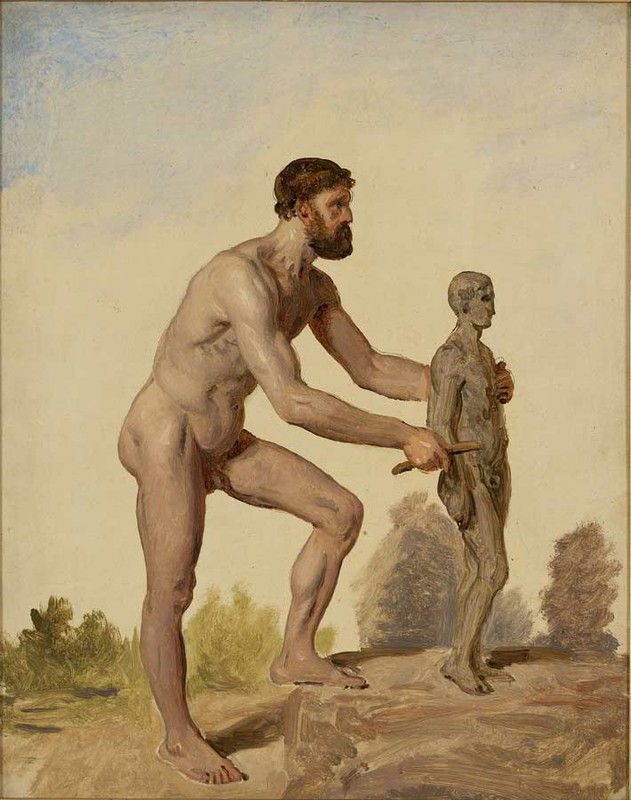
Within seconds all the little beings were alive and moving. Just moments later they were trying out their limbs, eyes and other senses. In his joy Zeus took both Prometheus´s hands and danced him round and round. Which frightened the creatures. Not until they shrank themselves to their size and by giving embraces, smiles and soft words the bewildered creatures were slowly pacified and befriended.
They clustered around the three immortals, bowing and prostrating themselves. ‘There is no need to bow,’ said Prometheus. But Zeus didn’t agree; we are their gods and they are not to forget it. `I am not their god`, said Prometheus, gazing down on them with an intense feeling of love and pride ´I am their friend, I shall teach them how to farm, how to mill wheat and rye so that they can make bread. How to cook and forge tools.’ ‘No!’ Zeus said, ‘you can befriend them as much as you like Prometheus, but there is one thing they are not to ever have and that is fire.
With fire they could rise up to challenge us. With fire they could think themselves our equals. Everything else in the world is theirs to enjoy. They may travel to every corner. They can sail Poseidon´s oceans, seek Dementer´s help in sowing seeds and growing food, learn from Hestia the arts of keeping a home, discover how to keep animals for their milk, fur and labour, and they can learn the arts of hunting from Artemis, Hermes can teach them guile, Apollo can instruct them in the arts of music and knowledge. Athena will teach them how to be wise and contented. And Aphrodite will share with them the arts of love. They will be free and happy.’
And so the early race of humans came to be. Gaia, Zeus, Apollo and Athena might be said to be its progenitors as much as Prometheus, who fashioned humanity from the four elements. Earth (Gaia´s clay), Water (the spittle of Zeus), Fire (the sun of Apollo) and Air (the breath of Athena). They lived and thrived, exemplifying the best of their creators. But something was missing…
The bountiful earth, made fertile and fruitful by Dementer, was sweet paradise for the first men. They knew no disease, poverty, famine or war. Life was an idyll of innocence and light pastoral duties. It was a time of happy worship of, and familiarity and even friendship with, the deities who moved amongst them. Perhaps we only imagined these first days of beautiful simplicity and universal kindness so that we could have a high point of paradisal sublimity against which to judge the low degrading times that came after.
It was natural that, of all the immortals, the one who loved humankind best should be their artist creator Prometheus. It saddened him that he had only been allowed to create male people, for he felt that this cloned single sex race lacked variety in both its outlook, disposition and character and its ability to breed and create new types.
To approach the godlike status that his creation deserved, mankind needed something more. They needed fire, to enable them to melt, smelt, roast, toast, boil, broil, fashion and forge, and they needed an inner creative fire too, a divine fire, to enable them to think, imagine, dare and do. And he knew exactly where to find it. Prometheus had never disobeyed Zeus before. Zeus was a beloved friend, but he was above all, Zeus. Much as he always loved Zeus, he found that he loved mankind more. And so it came to be that he stole fire from the gods and gave it to mankind.
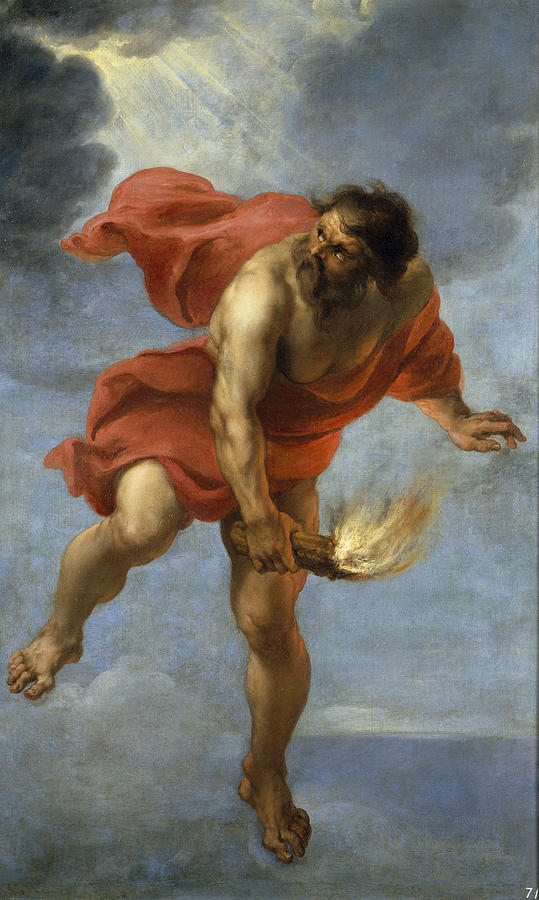
After discovering this betrayal Zeus’ wrath was so overwhelming that all Olympus feared Prometheus would be blasted with such power that his atoms would never reassemble. Instead his rage was focussed through a subtler and more dignified revenge. He would leave Prometheus alone for the time being and unleash his cosmic fury upon man, puny impudent man.
It started with his command to Hephaestus to do what Prometheus had done, to shape a human being from clay, moistened by his spittle, but this was to be the figure of a young female. Hephaestus took his wife Aphrodite, his mother Hera, his aunt Dementer and his sister Athena as models, and lovingly sculpted a girl of marvellous beauty into whom Aphrodite then breathed life and all the arts of love. The other gods joined together to equip this girl uniquely for the world. Athena trained her in the household crafts, embroidery and weaving, and dressed her in a glorious silver robe.
Hera endowed her with poise and self possession. Hermes schooled her in speech and the art of deception, curiosity and cunning. Since each of the gods had conferred upon her a notable talent or accomplishment she was to be called ´all gifted´, which in Greek is Pandora. Hephaestus bestowed one more gift upon this paragon, which Zeus presented himself. It was a container filled with secrets… Zeus told Pandora while giving the jar that she was to never open it. (There has been a mistranslation which basically got stuck. We commonly think it´s Pandora´s box, while it actually is Pandora´s jar.)
Prometheus through his foresight, knew that Zeus would seek some kind of retribution for his disobedience and warned his brother Epimetheus that, while he was away teaching the newly sprung up villages and towns how to use fire, he should on no account accept any gift from Olympus, no matter in what guise it represented itself. Nothing could prepare him for Zeus´s gift, however. Epimetheus answered a knock at the door one morning to see the cheerful smiling face of the messenger of the gods.
´May we come in?´ Hermes stepped nimbly aside to reveal, cradling a stoneware jar in her arms, the most beautiful creature Epimetheus had ever seen. ´Meet your wife to be´, said Hermes. ‘Her name is Pandora.’
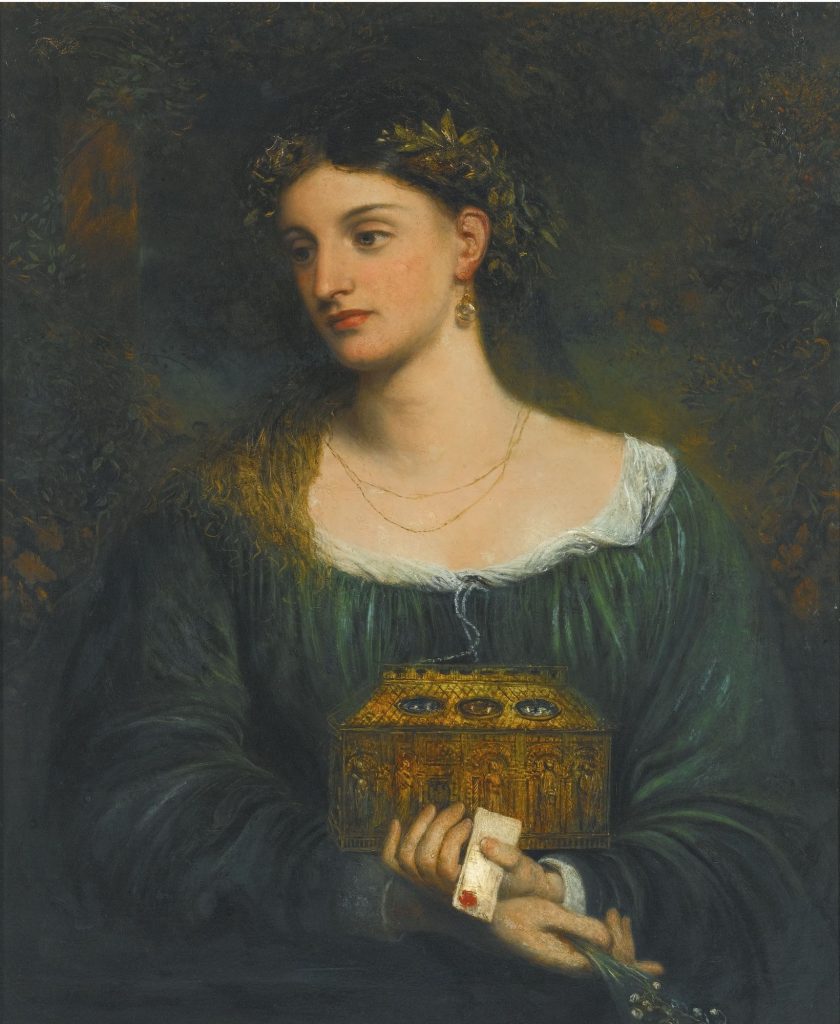
Epimetheus and Pandora were soon married. Epimetheus had an inkling that Prometheus – who was far away teaching – would not approve of Pandora. A quick wedding before his brother returned seemed a good idea. Epimetheus and Pandora were very much in love. That could not be denied. Pandora´s beauty and attainments were such as to delight him every day. But one little itch tickled her, one little fly buzzed around her, one little worm burrowed inside: that jar.
Why had Zeus even mentioned that there was nothing interesting inside it? He would never have said such a thing if truly there weren´t. There could be only one explanation. There was something of great interest inside.
She had sworn never to open it. ´A promise is a promise,´ she told herself. Temptation loses much of its power when removed from sight. So she buried the jar in the backyard. But only a couple of days later during a night when she had trouble sleeping she was unable to stand it anymore. Before she had time to tell herself that this was the wrong thing to do she leaped from her matrimonial bed and rushed in the garden to uncover the jar. While twisting the lid the waxen seal gave way. There was a fast fluttering, a furious flapping of wings. Oh glorious flying creatures! But no… They were not glorious at all. Pandora cried out in pain and fright as she felt something leathery brush her neck. More and more flying shapes buzzed from the mouth of the jar. Through the swirling fog of these dreadful creatures she saw the face of her husband as he came outside to see what was happening. With a great cry Pandora summoned the strength and courage to close the lid and seal the jar. On the garden wall, in the shape of a wolf, Zeus looked on, smiling the most terrible wicked smile.
What were they, these shapes? They were mutant descendants of the dark and evil children of both Nyx and Erebus. They were born of Apate, Deceit; Geras, Old age; Oizys, Misery; Momos, Blame; Keres, Violent death; they were the offshoots of Ate, Ruin and Eris, Discord. These were their names: PONOS, Hardship; LIMOS, Starvation; ALGOS, Pain; DYSNOMIA, Anarchy; PSEUDEA, Lies; NEIKEA, Quarrels; AMPHILOGIAI and PHONOI, Manslaughters and Murders. Illness, Violence, Deceit, Misery and Want arrived. They would never leave the earth. What Pandora did not know was that, when she shut the lid of the jar so hastily, she forever imprisoned inside one last daughter of Nyx. Its name was ELPIS, Hope.
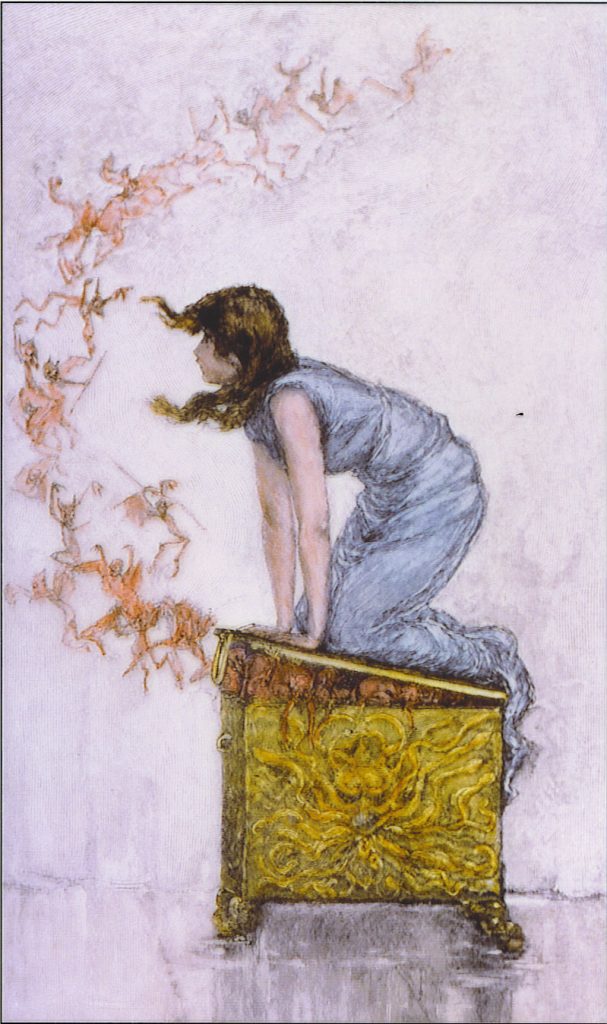
Pandora trying to close the box that she had opened out of curiosity. The evils of the world taunt her as they escape, F. S. Church.
In this way the golden age came to a swift and terrible end. Death, disease, poverty, crime, famine and war were now an inevitable and eternal part of humanity´s lot. But the silver age, as this epoch was to be known, wasn´t all despair. It differed from our own in that gods, demigods and monsters mingled with mankind, interbred with us and fully involved themselves in our lives. With fire on man´s side, and now women to allow propagation as well as full sense of family and completeness, some of the evils of Pandora´s jar were offset. People were duly in awe of the gods and used their new found affinity with fire to send burnt offerings up to Olympus as a mark of their obedience and devotion.
In the next post I will continue with the story and fate of Prometheus and Pandora. Zeus was obviously not done with taking revenge on mankind, his anger with Prometheus´s betrayal hadn´t subsided one iota. The Greeks created gods that were in their image, warlike but creative, wise but ferocious, loving but jealous, tender but brutal, compassionate but vengeful. The Olympian gods had characteristics which made an easy distinction between good and evil impossible since they carried both sides of the spectrum. But the flaws and virtues that were obviously in the Olympian gods made them good examples of what good and bad behaviour could entail.
Prometheus was mankind’s good and kind-hearted benefactor, his main gift to us was the creative fire, but it is good to point out that he taught us many other skills as well.
He didn’t view mankind as a threat, but rather as a pleasant responsibility. It´s similar to the way a father or mother loves his or her child and by teaching them hopes they will learn to stand on their own two feet. In contrast you see Zeus going apeshit after discovering mankind has fire in his possession. The betrayal by his best friend hurt him deeply, he had good reason to be angry. By creating Pandora, Zeus made the procreation of mankind possible, it shows us that manipulation doesn’t necessarily work out the way you hope it will. I would have to admit (spoilers) that in the end he was right, with fire mankind would eventually challenge the gods. But more on that later.
The ingenuity of the story and the seemingly logical way it unfolds still captivates me. Unfortunately Pandora´s mistake of opening the jar gave people the possibility to look at women with suspicion and view them as a weaker version of man, this way of thinking unsurprisingly found its way in Greek and eventually western society. This view on women continued through the ages, Consider the story of Adam and Eve, and the way Eve as the first woman is portrayed. The bible as we will discover when we continue with the story of Prometheus, has a lot of similarities with stories found in Greek and Egyptian mythology.
The clay creatures which were created by Prometheus were inspired and brought to life by the breath of Athena, this goddess is associated with wisdom, handicraft and warfare.
Pandora was inspired and brought to life by the breath of Aphrodite, the goddess associated with love, beauty, pleasure, passion and procreation. Those clever Greeks even managed to explain some of the differences between men and women through the goddesses that brought them to life.
For more about Greek mythology I recommend the following:
Theogony by Hesiod, translated by M.L. West.
The Library of Greek Mythology by Apollodorus, translated by Robin Hard.
Myth and Philosophy: A Contest of Truths by Lawrence J. Hatab.
The Iliad and Odyssey by Homer, translated by Robert Fagles.
Mythology: Timeless Tales of Gods and Heroes by Edith Hamilton.
Mythos and Heroes by Stephen Fry.
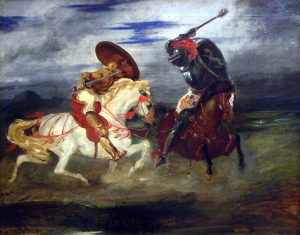
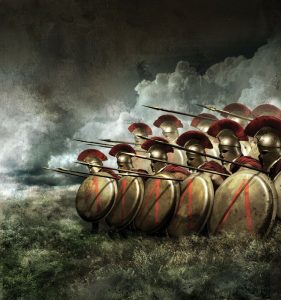
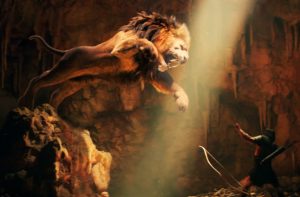

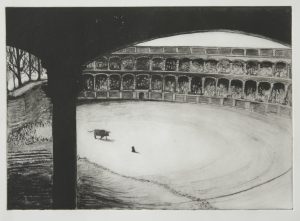
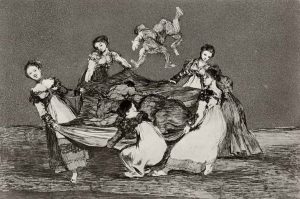
1 thought on “Prometheus, Pandora and the creation of mankind.”
Prometheus had warned Epimetheus not to accept gifts from Zeus but, Pandora’s beauty was too great and he allowed her to stay. Eventually, Pandora’s curiosity about the jar she was forbidden to open became to great. She opened the jar and out flew all manor of ev 496 ils, sorrows, plagues, and misfortunes. However, the bottom of the jar held one good thing – hope.